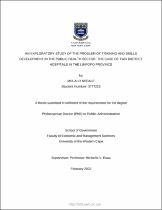| dc.contributor.advisor | Esau, Michelle V. | |
| dc.contributor.author | Nefale, Mulalo | |
| dc.date.accessioned | 2022-08-15T13:13:53Z | |
| dc.date.available | 2022-08-15T13:13:53Z | |
| dc.date.issued | 2022 | |
| dc.identifier.uri | http://hdl.handle.net/11394/9256 | |
| dc.description | Doctor Pharmaceuticae - DPharm | en_US |
| dc.description.abstract | Public health sectors across the globe are usually faced with challenges of adopting creative
ways to improve performance and service delivery in the form of investing in employee skills
development and training. During the apartheid era, employee training and skills development
were reserved for the white minority group. The South African dawn of democracy in 1994
did not automatically result in a change in the status quo. In spite of various regulatory
frameworks that emphasise skills development and training, skills development is still a
problem, more than 25 years later. Amidst the high unemployment levels, there is also a short
supply of critical skills or scarce skills in key sectors such as health. | en_US |
| dc.language.iso | en | en_US |
| dc.publisher | University of the Western Cape | en_US |
| dc.subject | Public administration | en_US |
| dc.subject | Public healthcare sector | en_US |
| dc.subject | Healthcare professionals | en_US |
| dc.subject | Pharmacy | en_US |
| dc.subject | South African | en_US |
| dc.title | An exploratory study of the problem of training and skills development in the public health sector: The case of two district hospitals in the Limpopo province | en_US |
| dc.rights.holder | University of the Western Cape | en_US |

